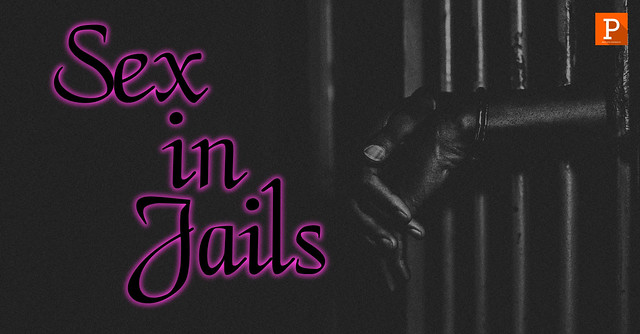Sexual release is a basic human need but it has always been subject to social norms, law and morality. In Thai prisons, regulations place even the internal needs of inmates under the state’s vigorous control.But the state can never fully control the force of human desire. Sexual activities happen in the everyday reality of prison life, though consensual sexual activities are largely limited to partners of the same sex. Sexual activities in prisons occur both among lovers and as pragmatic commerce.
According to the Department of Corrections Thailand’s prisons house some 269,745 inmates whose gender does not correspond to their biological sex as of 24 December 2015. These are stories that ‘outsiders’ may have never heard.
Behind-bars marriage and ‘love hotel’ brothels
Am is an ex-inmate who identifies as sex and gender diverse (SGD). She was imprisoned in 2014. She recounts that she was treated generally well by wardens and other inmates.
“The boss (wardens) banned male prisoners from harassing katoey (transwomen) inmates. Sexual harassment was not an issue because men obeyed the rule.”
Am’s prison had many SGD inmates, making it common to see partnering and wedding ceremonies behind bars. When couples decided to marry, a warden could issue a marriage certificate valid only in the prison.
Once married, the couple was forbidden to commit adultery. If this rule was violated, the guilty party would be punished by being splashed with sewage or submerged in a sewage container for some time.
Yong, an inmate in a northern prison for over 3 years, recounts similar experiences of in-jail wedding ceremonies. Wardens were invited to chair a simple ceremony to announce the coming together of a couple. At the end of the ceremony, the couple would host a small reception with food from the Prison Welfare Shop for their peers.
Yong added that some influential inmates — referred to as ‘big bros’ — succeeded in brewing liquor for their guests. Secretly, inmates fermented liquor by buying bread and yeast. The yeast was used in a fermentation process with glutinous rice in closed-lid buckets. When yeast eats sugar, it releases alcohol.
While Thai prisons are accepting of weddings and coupling, sexual intimacy remains inherently troubled since prisons are designed to make inmates feel as though they are being constantly watched. While intercourse needs privacy, the prison is a place with few hidden corners. Someone always sees or hears. Perhaps only ‘big bros’ can use toilets to masturbate alone. No one dares to disturb them.
Prison rules clearly prohibit and punish sexual acts. If a warden sees sexual activities, inmates can be disciplined immediately. But all this does not mean that prison is a place where people do not have sex at all.
Indeed, unofficial businesses have sprung up purely to serve the sexual needs of inmates. Am reported that from Monday to Friday, all inmates were required to work in assigned divisions. But they were free on Saturday and Sunday, when wardens let the inmates relax.
The few hours free from the wardens’ watchful eyes were valuable. In many prison, ‘big bros’ operate make-shift brothels or ‘love hotels’. Payment is made by bartering goods such as cigarettes.
"Ladyboy groups have big sisters — senior ladyboys — who set up temporary sheds from blankets draped in the form of enclosed rooms. Clients can buy time with them, while married couples can rent the sheds.”
“But [the love hotels] are only tolerated on the weekend. If the sheds are opened on other days, responsible prisoners will be heavily punished.”
Boss, a former political prisoner in the central region for more than two years, also remembers ‘love hotels’ from his time in prison. He recalls that sex in prison was common and helped inmates relieve stress from the pressure of prison life.
“[Sex in prison] could be dirty, indecent, whatever. For long-term prisoners, having sex with a ladyboy is a form of relaxation. Some fall in love and live as couples.”
“Sure, you can jack-off in prison if you do not care about being seen. But some people like friction, penetration and contraction. Some people need something like that.”
Boss recalled that his prison had several ‘love hotels’ but that his zone was the most famous. Its name rhymed with a famous red light district in Bangkok and was popular because it only allowed inmates under 22 years of age. Most people using this service were 'big bros'.
Ness, a fellow ex-inmate of Boss, believes that sex in prison was far from being regarded as sinful.
“Inmates think it’s normal. It’s understandable for men who have been imprisoned for many years. They have needs and want release. When someone sees an inmate departing from [a love hotel], they won’t tease because they understand that it is normal."
Access to condoms varies from prison to prison. Ness recalls that monthly boxes of condoms were distributed in his prison to prevent sexually transmitted diseases.
But Am said access to condoms in her prison was difficult. Inmates were forced to sign a list to obtain condoms. Most inmates did not dare to volunteer themselves, aside from the ‘big bros’.
If inmates asked for condoms too regularly, a warden would investigate whether they were engaging in sexual commerce. If caught, they would be punished.
“Prevention is difficult. An inmate friend is now living with HIV and is on antiretroviral therapy. It's not easy to ask for condoms. Who would dare to sign the form unless they are big bros?"
Sexual abuse and ‘influential figures’
Am recalls that some prisoners turned to the sex trade to earn a living in prison currency.
"Some ladyboys do not have money. They may not have friends or visitors and are forced to engage in sex work for money. When you are in a prison, you need money to buy rice to eat and decent food. No one wants to eat from the canteen."
Sex in prisons can be consensual love or reciprocal barter in place of monetary exchange. However, there are stories of sexual abuse in prison. Am and Boss insist the abuse is real and that the harassment has lasting and devastating physical and psychological impacts on victims.
In prison, the slang ‘scoring young men’ refers to a process whereby ‘big bros’ or influential inmates persuade new-comers and young inmates to join their groups. The young inmates are invited especially if they have pale skin, are shapely and Chinese-looking, and if they do not know anyone in a prison. A 'big bro’ can arrange for special care for newcomers, such as not being assigned to daunting tasks, better meals and money loans.
Some big bros are interested in demonstrating their power and charisma by looking after other inmates. Nevertheless, some have the purpose of persuading newcomers to relinquish sexual partners in mind. The process may involve the use of violence to coerce.
“When a Chinese-looking white young men arrives, big brothers will approach them and ask for information like, where the inmate is from, what their charges are. Big brothers will take care of inmates, so they do not have to work hard. It does not mean that the new inmates will be recruited only for sex, but having young and good-looking inmates around a big brother will add to his prestige. Some big brothers want sex in exchange. Some newcomers are pliable and go along with sexual proposals," said Boss.
Boss remembers two cases of rape. The first case involved a male inmate persuaded to stay with a ‘big brother’ to pay a debt. Another case involved a Burmese inmate forced to have sex every day by threat of physically attack.
"Some inmates owed big bros a lot and they could not pay back. They would have to pay it back through sex. It was not consensual because if the borrowers disagreed, they might be beaten, perhaps to death. Finally, they would agree because the big bros had goons to threaten them. They do the deed in secret corners or a secluded space between buildings. If a warden finds out, they will be in trouble but no one dares to say anything.”
Boss believes that most sexual abuse in prison does not manifest in a sudden event, but happens in a subtle manner. The abuses are coercive in nature and usually involve ‘big bros’ extending offers or conditions an inmate cannot refuse.
Boss believes it is impossible to control sexual abuse in prisons. Wardens can relocate an abused inmate to another zone but big bros are omnipresent in the prisons. They can send goons to beat inmates who leak abuses to the warden.
Many people may think punishing those influential individuals can reduce sexual abuse and commerce. But to Boss, it is a systemic issue, “rather than a personal problem.”
“They want sex”: allowing sexual visitation
Boss believes that sexual commerce and STIs can be reduced if prisons allow inmates to spend time with their partners once or twice a year.
“Inmates want conjugal visits like foreign prisons, where inmates are allowed time with their partners. Right now, prisons have in-prison visits two or three times a year. You can see and touch your visitors. Some inmates hug, sniff, kiss, fondle the breasts or whatever. They cannot have sex though,” said Boss.
“I think prisons should organise conjugal visitation because people are suffering in prisons. The only release from such torture is having someone you love stay with you and really making love. Even now, though inmates cannot have intimate moments, just a letter from their wife is enough to make them go over the moon. Other people will mock them when they receive a letter because they are so happy.”
But conjugal visits may be difficult to implement because most Thai prisons are overcrowded. Prisons have insufficient resources to handle the tremendous numbers of inmates. They would not have the space to accommodate conjugal visits.
The proposal to allow inmates to have conjugal visits is not groundless. Assoc. Prof. Siriwan Kraisurapong, a lecturer in medical social sciences at Mahidol University has advocated for intimate visits in her 2014 report ‘Sex in Prisons’. The rationale behind her proposal is that ‘underground’ sex is resulting in unusually high rates of sexually-transmitted diseases such as HIV and hepatitis.
Siriwan argues that Thailand’s prison system has no clear policies recognising the sexual lives of inmates. Sexual violence is subsequently swept under the rug. She believes organisations working with prisoners should realise that sexual intercourse and sexual violence is present in prisons. Doing so is key to resolving health-related issues, including the transmission of sexually transmitted diseases.
"I do not think that intercourse in prison is wrong. I do not think it is a matter to be controlled, attacked, concealed or forbidden. Sex in jail can release mental tension if it is consensual. I think prisons should allow it,” concluded Siriwan.



